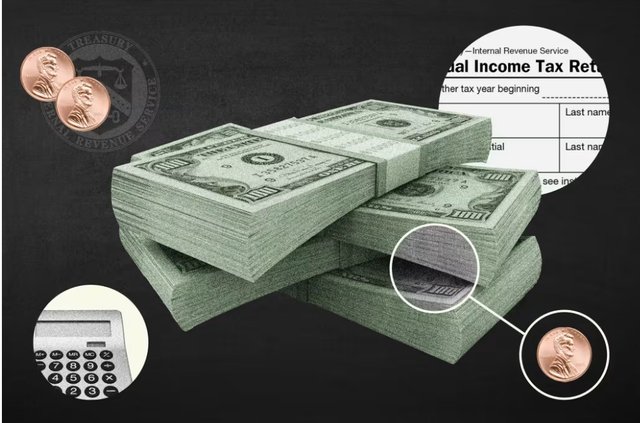
Karen Hube
Feb. 28, 2024
After years of ebbs and flows in potential tax deductions and credits, the pool of perks taxpayers can claim on 2023 tax returns has changed yet again.
Many opportunities to shave taxes evaporated in 2018 after the passage of the Tax Cuts and Jobs Act, but a gush of expanded or new credits and deductions became available during the pandemic to relieve families’ financial strain.
Now, pandemic perks have dried up for individuals, but more climate-related benefits have been added or expanded. Potentially one of the biggest is a credit for buying an electric vehicle—that credit will be covered in a coming article.
Here’s a look at a handful of other moves that could help whittle down what you owe for 2023:

Around 90% of taxpayers claim the standard deduction, but it’s still worth tallying deductible expenses to see if itemizing makes sense for you. ILLUSTRATION BY BARRON’S; DREAMSTIME (3), IRS (1)
Energy efficient home improvement credits
Homeowners can qualify for up to a total $3,200 in annual credits for 2023 energy-saving moves for their main home, up from a $500 lifetime credit in years earlier.
“People who used up their $500 credit now have the ability to take advantage of this higher amount,” says Mark Luscombe, principal federal tax analyst at Wolters Kluwer.
The credit has two broad components. The first is 30% of the cost, up to a $1,200, of building components like windows, a home energy audit and certain heating and cooling systems.
Within this component, categories have credit caps: $600 for windows; $250 for one door and $500 for all doors; $150 for a home energy audit.
The second component is up to $2,000 for qualifying heat pumps, water heaters and biomass stoves and boilers.
Residential clean energy credit
Homeowners can claim a credit equal to 30% of the cost of purchasing and installing solar, wind and geothermal power generation, solar water heaters, fuel cells and battery storage.
Under old rules the credit was to phase down to 26% for 2023, but the percentage was locked in at 30% a year through 2033 under the Inflation Reduction Act, passed in late 2022.
2023 retirement contributions
You have until April 15 to make a 2023 contribution for a regular or Roth IRA.
Contribution limits for Roth and regular IRAs for 2023 are $6,500 or $7,500 if you were 50 or older last year.
For SEP IRAs, used by many self-employed individuals, a 2023 contribution can be made by your tax-filing deadline for your business return, including any extensions. Contributions are capped at the lesser of 25% of compensation or $66,000.
Tax-favored growth is reason enough not to skip a year of savings, but you may also be able to claim a deduction.
SEP IRA contributions are tax deductible; Roth contributions are not, but any growth in your investments will be tax-free.
With regular IRAs, your 2023 contribution is deductible if you and your spouse aren’t covered by a retirement plan at work.
For savers with work plans, contributions are at least partially deductible if income is less than $83,000 for singles or heads of household, or $136,000 for a couples.
For savers without a work plan, but whose spouse has one, contributions are at least partially deductible when income is less than $228,000.
Distribute 2023 trust income
There is still time to distribute 2023 trust income to beneficiaries, a move that could significantly reduce the tax bite on the income.
While the same individual ordinary income-tax rates of up to 37% apply to trust income, the top rate kicks in on trust income of 14,451 compared with $693,751 for married couple and $578,126 for single filers.
Beneficiaries may pay less in taxes than the trust would, says Pamela Dennett, a partner at Eisner Advisory Group. “You have until Mach 5 in 2024 to make distributions and have them treated as if you made them in 2023.”
Tally up miscellaneous deductible expenses
While around 90% of taxpayers claim the standard deduction, which is $13,850 for singles and $27,700 for couples filing jointly in 2023, it’s worth tallying deductible expenses to see if itemizing makes sense.
Aside from up to $10,000 allowable deductions for state and local income and property taxes, consider any charitable contributions for 2023, which are generally 100% deductible up to 60% of your adjusted gross income.
Also, tally up out-of-pocket medical expenses. You can deduct any unreimbursed expenses in excess of 7.5% of your 2023 adjusted gross income.
Provisions hung up in Congress
Families who qualify for the child tax credit and business owners looking to shave back 2023 taxes hang in limbo as a bill with changes retroactive to 2023 awaits action by the U.S. Senate. The House passed the bill in late January.
The bill would expand the child tax credit for many families. It would fix the credit formula to ensure that more lower-income families qualify, and increase the refundable portion of the $2,000 maximum child tax credit from $1,600 to $1,800. Even if a taxpayer doesn’t owe taxes that portion can be refunded.
To qualify for a full credit, modified adjust gross income cannot exceed $400,000 for couples or $200,000 for singles, and a child must have been under age 17 in 2023.
The bill also would improve certain business tax incentives. For example, it would allow businesses to claim a 100% depreciation deduction for qualified assets in 2023, rather than 80%.
Some taxpayers may be tempted to wait to file taxes to see if the bill will pass. While it may make sense for business owners to file for a tax-filing extension, the IRS encourages individuals who qualify for the child tax credit to stick to their filing schedule.
If the child tax credit changes, the agency says it will automatically issue refunds to eligible taxpayers who already filed a 2023 return.
This Barron's article was legally licensed by AdvisorStream.
ILLUSTRATION BY BARRON’S; DREAMSTIME (3), IRS (1)



